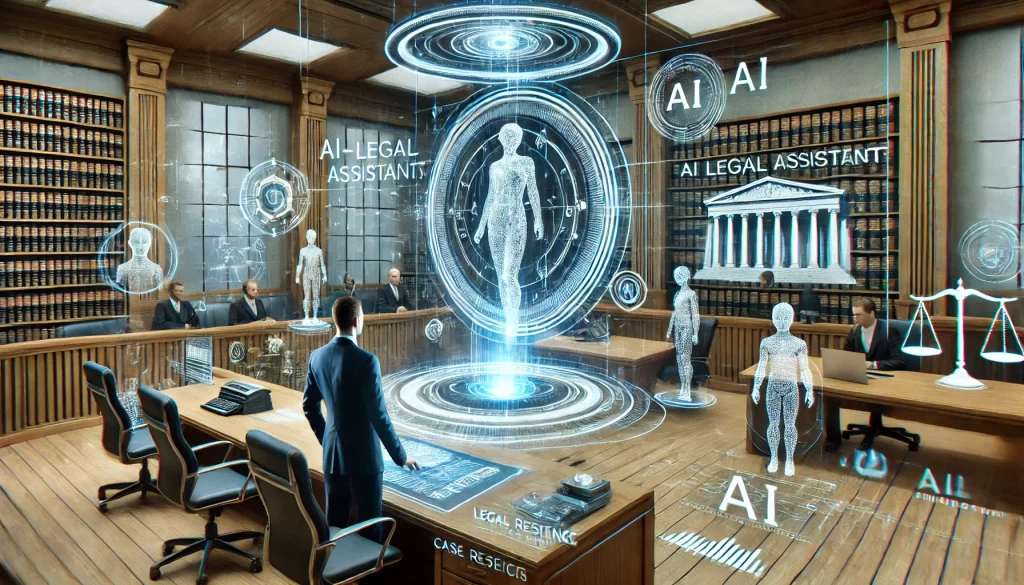How AI is Revolutionizing the Legal Industry
Artificial Intelligence (AI) is transforming industries worldwide, and the legal sector is no exception. From automating routine tasks to improving legal research and case prediction, AI is revolutionizing the legal industry in ways that were once unimaginable. Law firms, corporate legal departments, and courts are integrating AI-driven tools to increase efficiency, reduce costs, and enhance decision-making.
In this article, we will explore how AI is changing the legal profession, its benefits, potential challenges, and what the future holds for AI in law.
The Role of AI in the Legal Industry
AI is reshaping the legal industry by handling complex data-driven tasks with speed and accuracy. Here are some of the key areas where AI is making a significant impact:
1. Legal Research and Document Review
Traditional legal research is time-consuming, requiring lawyers to sift through countless case laws, regulations, and statutes. AI-powered legal research platforms, such as Westlaw Edge and ROSS Intelligence, use natural language processing (NLP) to quickly analyze vast amounts of legal data and provide relevant case precedents.
2. Contract Analysis and Automation
AI tools can review contracts, identify potential risks, and even draft contracts based on standard templates. Platforms like Evisort and Kira Systems use machine learning to analyze contracts, reducing the time spent on contract review from hours to minutes.
3. Predictive Analytics for Case Outcomes
AI-powered predictive analytics tools can assess past case rulings, judge behaviors, and legal arguments to predict the outcome of cases. Lex Machina and Premonition AI are leading tools that help lawyers make data-driven decisions about litigation strategies.
4. Chatbots and Virtual Legal Assistants
Law firms are leveraging AI-powered chatbots to assist clients with basic legal questions, schedule consultations, and guide them through legal procedures. DoNotPay, for instance, provides automated legal advice and helps users fight unfair fines and claims.
5. E-Discovery and Litigation Support
AI significantly enhances e-discovery, which involves identifying, collecting, and reviewing electronic documents for litigation. AI-driven e-discovery platforms like Relativity help legal teams find crucial documents faster, improving efficiency and reducing legal costs.
6. Compliance and Risk Management
AI assists businesses in ensuring compliance with legal and regulatory frameworks by continuously monitoring changes in laws. Platforms like IBM Watson Legal analyze and interpret regulatory requirements, helping firms avoid penalties and legal disputes.
Benefits of AI in the Legal Industry
AI adoption in law offers several benefits, including:
1. Increased Efficiency
AI speeds up legal research, contract review, and case analysis, allowing lawyers to focus on complex legal strategies rather than administrative tasks.
2. Cost Reduction
By automating repetitive legal tasks, AI helps law firms cut down on operational costs and increase profitability.
3. Improved Accuracy
AI minimizes human errors in legal research and contract analysis, ensuring better accuracy and compliance.
4. Better Client Experience
AI-driven chatbots provide instant legal assistance, improving client satisfaction and response times.
5. Enhanced Decision-Making
Predictive analytics enable lawyers to assess risks more effectively and make data-backed legal decisions.
Challenges and Ethical Concerns
Despite its advantages, AI in the legal sector also presents some challenges:
1. Ethical and Bias Concerns
AI algorithms are trained on historical data, which may contain biases. If not properly monitored, AI-driven decisions could reinforce existing prejudices in legal rulings.
2. Data Privacy and Security Risks
Legal AI tools process sensitive client data, raising concerns about cybersecurity and data breaches.
3. Job Displacement
While AI automates routine legal tasks, there are concerns that it may replace entry-level legal jobs, such as paralegals and junior associates.
4. Lack of Human Judgment
AI lacks the human intuition and empathy required for complex legal reasoning and negotiations.
The Future of AI in Law
AI’s influence in the legal industry is expected to grow, with advancements in:
1. AI-Powered Legal Assistants
Future AI tools will become more sophisticated, offering deeper insights and automation for legal professionals.
2. Blockchain and Smart Contracts
Blockchain technology will integrate with AI to create self-executing smart contracts, improving transparency and efficiency.
3. Enhanced AI Regulations
Governments will implement stricter regulations to ensure ethical AI use in legal processes.
4. AI-Augmented Decision-Making
Rather than replacing lawyers, AI will enhance their capabilities, enabling them to make more informed legal decisions.
Conclusion
AI is revolutionizing the legal industry by automating legal research, improving case predictions, and enhancing efficiency. While AI presents ethical and security challenges, its benefits outweigh the risks when used responsibly. As AI continues to evolve, legal professionals must adapt and embrace AI-driven innovations to stay ahead in the legal landscape.
The legal industry is on the brink of a technological transformation, and AI will play a crucial role in shaping its future. By leveraging AI-powered tools, law firms can enhance their productivity, reduce costs, and provide better legal services.


